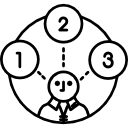Programming: Difference between revisions
Mr. MacKenty (talk | contribs) |
Mr. MacKenty (talk | contribs) |
||
| Line 25: | Line 25: | ||
* [[Constants]] | * [[Constants]] | ||
== | == Primitive data types == | ||
In computer science and computer programming, a data type or simply type is a classification of data which tells the compiler or interpreter how the programmer intends to use the data. Most programming languages support various types of data, for example: real, integer or Boolean.<ref>https://en.wikipedia.org/wiki/Data_type</ref> | In computer science and computer programming, a data type or simply type is a classification of data which tells the compiler or interpreter how the programmer intends to use the data. Most programming languages support various types of data, for example: real, integer or Boolean.<ref>https://en.wikipedia.org/wiki/Data_type</ref> | ||
The list below describes some of the more common primitive data types | |||
* [[Objects]] | * [[Objects]] | ||
Revision as of 05:51, 7 August 2017
This is one of the most important ideas you can remember:
Decompose a problem into smaller parts, diagram a problem. Learn to think sequentially

Introduction to programming[edit]
Programming is the issuing of instructions to a computer. You must learn how to issue instructions to a computer.
- What is a programming language?
- High level languages
- Low level languages
- Translating high-level code to low-level code
- Compiler
Basic understanding[edit]
Primitive data types[edit]
In computer science and computer programming, a data type or simply type is a classification of data which tells the compiler or interpreter how the programmer intends to use the data. Most programming languages support various types of data, for example: real, integer or Boolean.[2]
The list below describes some of the more common primitive data types
Common data structures[edit]
Control Flow[edit]
In computer science, control flow (or flow of control) is the order in which individual statements, instructions or function calls of an imperative program are executed or evaluated. [3]